This is my homework post for Steemit Engagement Challenge Season 20 Week 2 assignment of Professor @dexsyluz’s class, Hemoglobin.
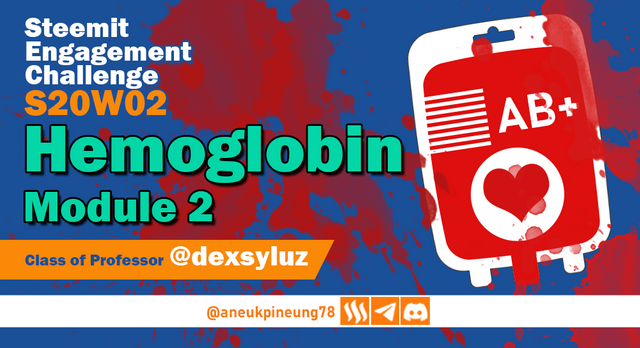
Note :
- I performed this task on Windows 10 PC, Google Chrome.
Task 1 - Death of Rafael Rangel
I know that in the lecture Professor @dexsyluz had said not to write too long, but I feel that in order to write about the death of Dr. Rafael Rangel, we need to first know at least a little about who he was.
“It doesn't need to be very long, just go straight to the point in answering the questions.” Professor @dexsyluz.
Dr. Rafael Rangel was a Venezuelan medical doctor and scientist. He is one of Venezuela's most renowned medical scientists and was the country's first parasitologist. His work has contributed greatly to the fight against tropical diseases, not just in his country. During his lifetime he researched and tried to combat tropical diseases - among others -: malaria, hookworm, leishmaniasis, and amoebiasis.
The country and people of Venezuela respected Dr. Rafael Rangel so much that in 1987, an administrative area in the state of Trujillo in Venezuela was named Rafael Rangel Municipality. Dr. Rangel was actually born in Betijoque, the state of Trujillo, on April 25, 1877.
Dr. Rafael Rangel died at the very young age of 32. A mistake in an experiment on August 20, 1909 ended up taking his life that very day. According to his colleagues, on that day, while in his laboratory, Dr. Rangel mixed Potassium Cyanide (KCN) with wine and drank it. Dr. Domingo Luciani, Dr. José Rivas and Dr. JM Salmeron Olivares who happened to be in the same laboratory at the time heard Dr. Rafael's screams of pain, ran there and found Dr. Rafael dying. Dr. Luciani asked him what he had drunk. Dr. Rangel replied, “Potassium cyanide”. Their efforts to save Dr. Rangel's life were unsuccessful and he died a few minutes later.
Other sources also mention that the autopsy recorded that Dr. Rangel had suffered hemoglobin poisoning due to the presence of potassium cyanide in his blood. Potassium cyanide is one of the ingredients of the Drabkin Reagent solution (the other ingredients include Potassium Ferricyanide (K3[Fe(CN)6]) and another substances. In the world of medical science, Drabkin Reagent is used to convert hemoglobin into a stable form that can be measured spectrophotometrically.
There was controversy in the community as to whether the poisoning was intentional or purely an experimental error. Suspicions of suicide were raised because at the end of his life Dr. Rangel was known to experience great depression and despair. He could even cry suddenly while giving lectures to his students. According to stories around his dead, he was disappointed at the lack of support he received from his colleagues, as well as the poor research facilities. The country and people of Venezuela, however, still honor him as one of the medical scientists who contributed greatly, not only to Venezuela.

Task 2 - Describe Hemoglobin
Before we talk about hemoglobin, we should take a look at the following picture that explains the content of human blood. Note: I made the picture with references from various sources on the internet.
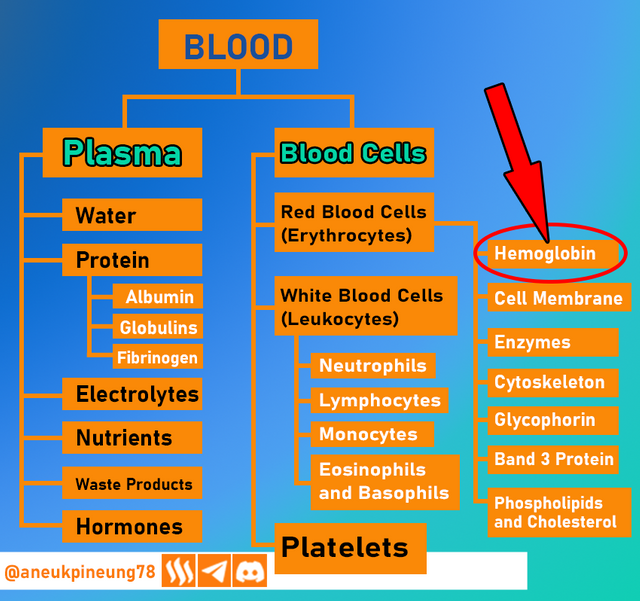
Hemoglobin is found in red blood cells and is one of the most important proteins of the red cell blood. Hemoglobin is responsible for transporting oxygen from the lungs to the rest of the body and bringing carbon dioxide back to the lungs to be expelled from the body through the respiratory process. A normal hemoglobin level is important for every human being, although there are slight differences between people in what is called normal, which is influenced by several things such as age, health conditions, gender, nutrition, altitude, and hormones. 2 cases of abnormal hemoglobin levels:
- Anemia, which is a condition that describes hemoglobin levels that are too low. Anemia can cause fatigue, weakness, and shortness of breath.
- Polycythemia, a condition where the hemoglobin level is too high. Too high levels of hemoglobin in the blood can be a sign of health problems, such as dehydration or lung problems. Polycythemia is divided into 2:
- Polycythemia Vera, caused by abnormalities in the bone marrow.
- Secondary Polycythemia, caused by something other than an abnormality in the bone marrow, such as chronic lung disease and hypoxia (lack of oxygen).
There are different types of hemoglobin, among the most popular are: Hemoglobin A (HbA), Hemoglobin A2 (HbA2), Hemoglobin C (HbC), Hemoglobin E (HbE), Hemoglobin F (HbF), and Hemoglobin S (HbS). Hemoglobin is differentiated based on differences in structure and function. These differences affect its ability to bind and transport oxygen. Various hematological disorders can be caused by abnormal hemoglobin types.

Task 3 - Automated Hematocrit vs Manual Hematocrit
Hematocrit is the measurement of the percentage of red blood cell volume in the total blood volume. For example, there is a blood sample of 100 cc, and after examination, it is found that the red blood cell content is 78 cc, then it is said that the blood has a hematocrit value of 78%. Hematocrit measurement is important to assess a person's health, especially in the context of health related to blood problems such as anemia and others. The normal values of hematocrit are as follows:
- Male: 40 - 54%
- Women: 37 - 47%
- Children: varies depending on age.
There are two hematocrit measurement systems: manual hematocrit and automatic hematocrit. The following table explains the differences between the two from several aspects (made based on various sources in the internet):
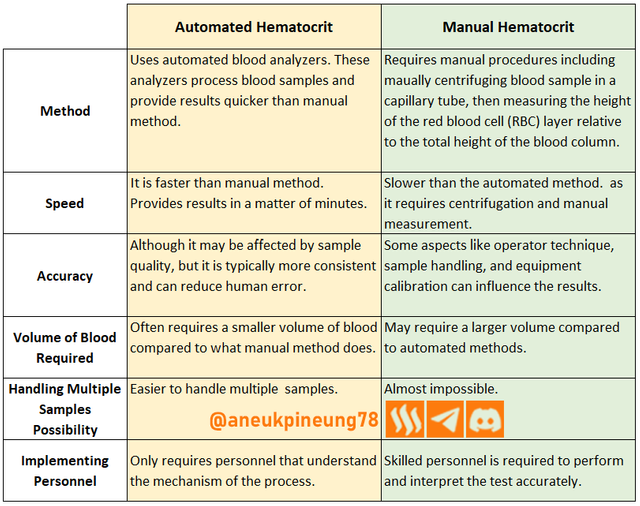
Based on the comparative data between the two methods as shown in the table above, it is not surprising that automated hematocrit measurement is generally preferred, especially because it is faster and more consistent. While manual methods may be used in certain situations, for example, the unavailability of automated methods or for other purposes such as quality control.

Task 4 - Explain a real-life example with the concept of hematocrit
An example of hematocrit in real life outside of the medical world (in this case I cite a case in the world of civil engineering) is the dust content in building sand. It is necessary to know what percentage of dust content is in the sand to know whether the sand is suitable for civil engineering work. In the world of hematology, this is like determining whether the level of red blood cells in the blood is at a safe level.
The percentage of dust content in the sand is then measured, either automatically or manually. Manually, this can be done for example by using a measuring cup (measuring cylinder). The method is to take a volume of sand as a sample, put it in a measuring cup and mix it with some water, shake it so that the dust separates from the sand, then let it sit. After a while, the dust and sand will settle to the bottom of the measuring cup, with the sand at the bottom (in accordance with its greater specific gravity than the dust). At this time, the dust volume can be read. The total volume of dust in the sample divided by the total volume of the sample, multiplied by 100%, gives the percentage of dust in the sand sample. Automated measurement will involve more modern and computerized equipment.

Task 5 – The Quiz
Regarding the quiz, I found this to be a “tricky” question since Drabkin's Reagent, according to my findings on the internet, contains these two substances (Potassium Cyanide (KCN) and Potassium Ferricyanide (K3[Fe(CN)6])) in addition to other substances, and it is a single choice question model, not multiple choice. And the reagent does not contain Acido Acetílico (Acetylic Acid) and Methylene Blue, so I can not choose [all of the above]. But then I chose Potassium Cyanide, since that was what killed Dr. Rangel. May he rest in peace.
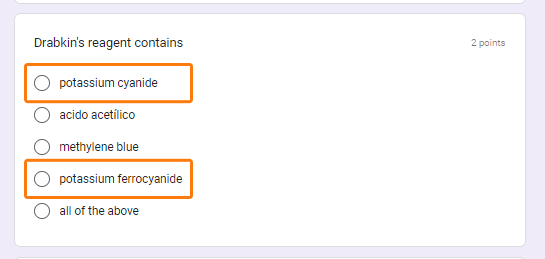

Thanks
Thanks Professor @dexsyluz for the lesson. I invite @malikusman1, @simonnwigwe, and @stream4u.
Pictures Sources
- The editorial picture was created by me.
- Unless otherwise stated, all another pictures were screenshoots and were edited with Adobe Photoshop 2021 or created by me USING Adobe Photoshop 2021 or another applications.
Sources and Reading Suggestion
- https://es.wikipedia.org/wiki/Rafael_Rangel
- https://en.wikipedia.org/wiki/Rafael_Rangel_Municipality
- https://www.findagrave.com/memorial/176019898/rafael-rangel
- http://www.ucv.ve/organizacion/facultades/facultad-de-medicina/decanato/bioanalistas-homenajearon-a-rafael-rangel.html
- https://www.sigmaaldrich.com/deepweb/assets/sigmaaldrich/product/documents/139/718/d5941dat.pdf
- https://www.sigmaaldrich.com/ID/en/product/sigma/d5941
- https://www.halodoc.com/artikel/mengenal-hemoglobin-fungsi-dan-kadar-normalnya-pada-tubuh
- https://www.alodokter.com/memahami-fungsi-hemoglobin-dan-kadar-normalnya-dalam-tubuh
- https://www.siloamhospitals.com/informasi-siloam/artikel/kadar-hemoglobin-normal
- https://www.halodoc.com/artikel/perlu-tahu-ini-3-fungsi-penting-hemoglobin-dalam-tubuh
- https://www.klikdokter.com/info-sehat/darah/mengenal-apa-itu-hemoglobin-kadar-normalnya-dan-fungsinya-pada-tubuh
- https://en.wikipedia.org/wiki/Hemoglobin
- https://www.redcrossblood.org/donate-blood/dlp/hematocrit.html
- https://my.clevelandclinic.org/health/diagnostics/17683-hematocrit
- https://www.mayoclinic.org/tests-procedures/hematocrit/about/pac-20384728
- https://www.ncbi.nlm.nih.gov/books/NBK542276/
- https://www.medicalnewstoday.com/articles/hematocrit-levels




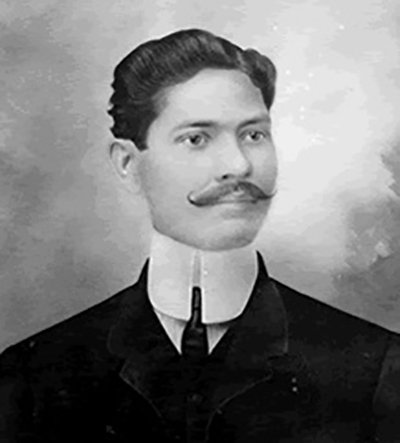.jpg)

https://x.com/aneukpineung78/status/1837780963222536549
Downvoting a post can decrease pending rewards and make it less visible. Common reasons:
Submit
Wow... Excellent..
The explanation is quite good and can increase your knowledge. Even though I am a health worker, my knowledge is not that far.
Yes, that's normal, because I have other specialties.
Downvoting a post can decrease pending rewards and make it less visible. Common reasons:
Submit
The funnier is, I am not a paramedic, yet I know this kind of thing. Hahahah. Thanks to the Steemit Engagement Challenge with Professor @dexsyluz ,, and of course the search engine, the miracle of our time. 😆😆😆
Don't you agree when I say that in some way, Steem has made its users a little bit smarter? Chief?
Downvoting a post can decrease pending rewards and make it less visible. Common reasons:
Submit
I agree because the SEC program requires us to continue looking for data, materials and learning.
Downvoting a post can decrease pending rewards and make it less visible. Common reasons:
Submit
Yes. reading, and learning. And I guess it's in my blood learning new things. And writing scientific articles is also one of the thing I love to do. It's like an adventure : I read the courses and the tasks, collect information from internet, write the articles. And Season 20 I think is the best of all seasons I have been involved, so far, which is not that much. There are 16 classes every week, every one will likely to find the right class(es) for them.
Chief, will you be involving in one of the classes, maybe?
Downvoting a post can decrease pending rewards and make it less visible. Common reasons:
Submit
Currently my health condition is not good and I have been on bedrest for two days. I need to recover myself first so I can return to my activities as soon as possible
Downvoting a post can decrease pending rewards and make it less visible. Common reasons:
Submit
Ah yes, you need to rest. Don't worry about the world, me and the rest of the Avengers will protect it. I wish you to get well soon.
what is it that you have, is it fever?
Downvoting a post can decrease pending rewards and make it less visible. Common reasons:
Submit
Yes, I have a fever and have stomach problems
Downvoting a post can decrease pending rewards and make it less visible. Common reasons:
Submit
source
Downvoting a post can decrease pending rewards and make it less visible. Common reasons:
Submit
this is something very inspiring and worth reading....are you a medical specialist?.....all the tasks are perfectly done...the example you gave to explain the hematocrit is very comprehensible.... Good luck 🤞
Downvoting a post can decrease pending rewards and make it less visible. Common reasons:
Submit
😆
Anyway, thanks for stopping by.
Downvoting a post can decrease pending rewards and make it less visible. Common reasons:
Submit